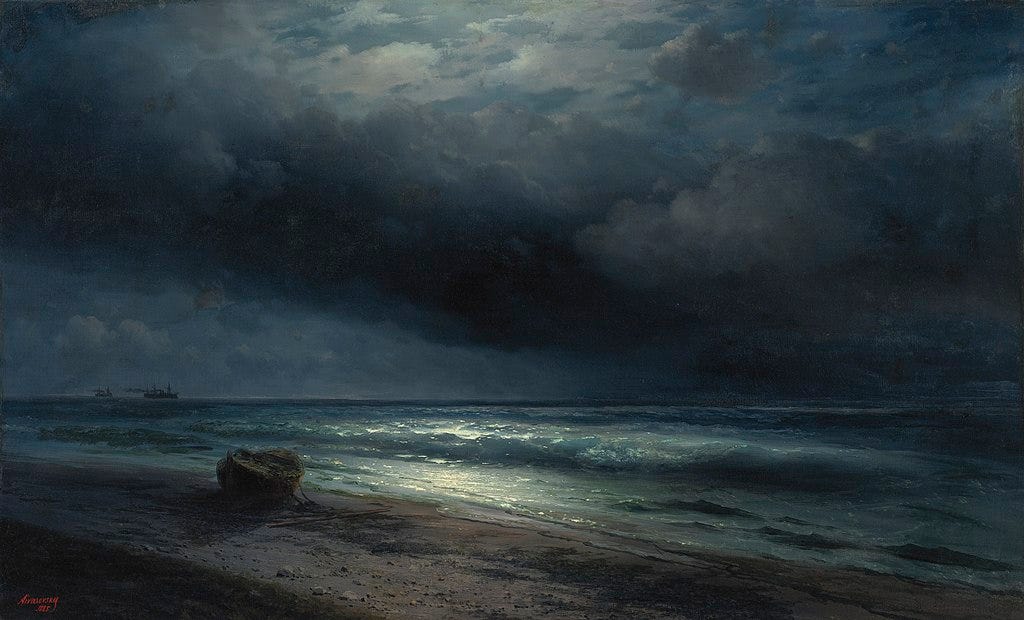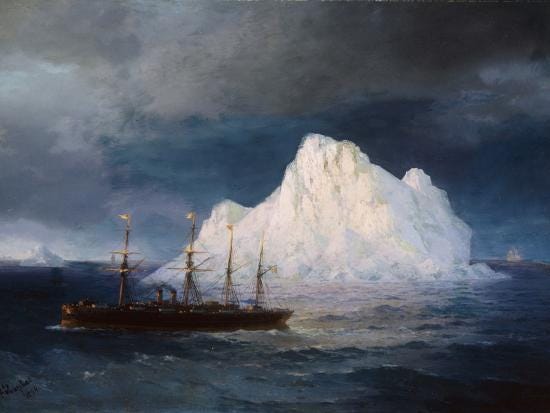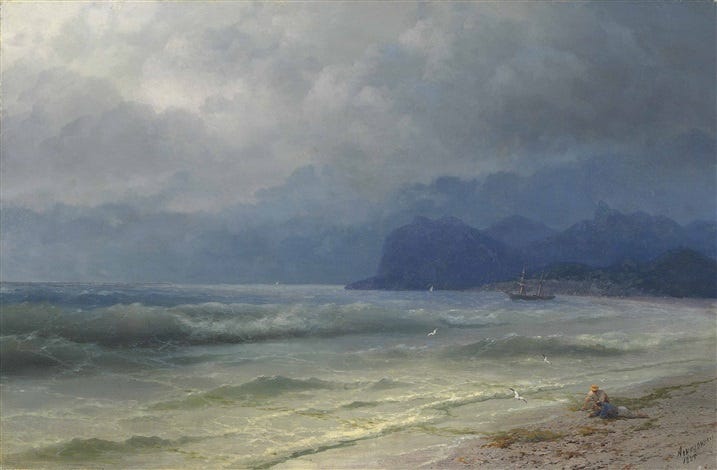Beaches of Rebirth and Memory
Below are spoilers for Inception and Pokémon Mystery Dungeon: Explorers of Darkness.
When I think about beaches, I instinctively think of a beach day: unstable umbrellas, sprawled-out towels, and kids shouting amid the waves. Beach days have a relaxing commotion to them— there’s enough peace for them to be soothing, but also enough activity to drown out bothersome thoughts.
But beaches take on an entirely new character in the absence of crowds. When I’m on the beach alone, the vast planes of sand and water have a way of encouraging deep thought. Eventually I start to feel this pull, not unlike the “call of the void” that comes when standing on the edge of a cliff. It’s like the depths are calling out to me, singing a siren song.
All life on Earth initially came from beneath the waves. In light of this, I often think of this siren song as a last vestige of my aquatic past, an echo of the watery world of my ancestors. This reading gives the beach a sort of primal atmosphere.
The association between beaches and rebirth has existed in the West since at least Ancient Greece. Aphrodite came into being on a beach, emerging out of the sea-scattered remains of the primordial Uranus. This simple myth shows that even beings as ancient as the Greek gods can claim descent from a past existence.
The association is even stronger in the Odyssey, in which Odysseus washes up on two separate Beaches of Rebirth: Ogygia and Scheria. Ogygia is the idyllic home of the goddess Calypso, who keeps Odysseus “unstuck in time” and away from his past life as an adventurer. While Odysseus longs for his past, there are perks to his new existence. Calypso represents what Odysseus could enjoy if he just gave up his past.
Scheria is the opposite: a mundane island that Odysseus washes up on after returning to the mortal world. Nausicaa is the first mortal that Odysseus sees in years, and she represents his return to humanity. It’s easy to forget this due to the Odyssey’s scope, but Odysseus spent seven years on Ogygia: enough of a past to forge a new identity. In both cases, Odysseus’ new life was inseparably tied to leaving an old identity behind.
More recently, our culture has linked the beach to memory. Memory has long been associated with water, but the beach became specifically associated with memory when Sigmund Freud proposed his model of the mind.
Freud thought of the mind as an iceberg— conscious thoughts sitting above the water and unconscious forces swirling below the surface. If the deepest parts of the mind lie below the waves, then the beach becomes a natural gateway into those depths.
Carl Jung furthered this association with his theory of the collective unconscious. According to Jung, much of human thought comes out of this primal reservoir that we all access, knowingly or not. Thoughts feel even more oceanic when we imagine them emerging from some primordial soup of ideas.
The idea of the collective unconscious also expanded the possibilities for rebirth. Not only was Jung’s idea of the self intimately connected to past lives, but it was also less static than that of the Greeks. Jung believed the human psyche was a highly dynamic composite that constantly changes as it interacts with the collective. A sufficiently dramatic change could produce rebirth solely within the mind— no death or divine intervention required.
It wasn’t long before these psychoanalytic ideas found their way into art. They gave narratives more scientific tools to tell stories about new identities. Eternal Sunshine of the Spotless Mind (2007) tells of two ex-lovers’ attempts to erase their memory of each other in order to embrace a new existence. And its most prominent setting is the beach at Montauk: the backdrop for the film’s most pivotal moments of remembering, rebirth, and forgetting.
This trio of beaches, rebirth, and memory has become one of the most formidable emotional anchors in fiction. On a personal level, I spent many a childhood vacation thinking Big Beach Thoughts, which drove this association even deeper into my psyche. So it’s no surprise that the two most affecting fictional stories of my tween years both riffed on these themes.
The 2010 film Inception opens with the protagonist Cobb washing up on the beach. In his semi-conscious state, he sees two children building a sandcastle before a soldier drags him in for questioning. This is no physical Beach of Rebirth, but a beach of the dreamworld: a manifestation of the unconscious. Later in the film, we learn that the kids in the scene are Cobb’s own children, frozen in time just as he remembers them.
Throughout the film, Cobb is haunted by a past life that he can never return to. He is especially haunted by the death of his wife Mal, whom he may have driven to suicide. The movie is just as much about the central heist as it is about Cobb trying to come to terms with his own past.
At the end of the film, Cobb seemingly returns to his family life. But the director intentionally makes the ending ambiguous— is it real, or is it a dream? I interpreted the end of Inception as Cobb accepting his life in a dream. Everything just feels too unreal— the kids are the exact same age as they were in his memory, and there just isn’t the sort of friction you might expect. It’s just too perfect.
This made Inception absolutely haunting to my younger self. I had never had a story fill me with so much uncertainty— a regular mystery is one thing, but not knowing whether the concluding events were real called my entire narrative experience into question. When I went to bed that night, I couldn’t get that final scene out of my head.
But my younger self’s biggest fascination with the film was the sheer scale of Cobb’s life. Like Odysseus, Cobb spends years and years of his life “unstuck in time”, living with Mal in Limbo for not seven years but decades. It got me to question many of my assumptions about identity— is the Cobb that left even the same person that went in?
However, these concepts would not have been so sticky without the landscapes that Inception used to ground its heady concepts. While the Beach of Rebirth in Limbo was the most resonant, I also vividly remember the “kick” of the crash into the river and the vast snowy cliffs at the bottom of the dreamworld. By rooting its key concepts in physical locations, Inception remained accessible to people like my younger self.
But the most resonant Beach of Rebirth from my childhood came from an unlikely source: the often-forgotten video game Mystery Dungeon: Explorers of Darkness (2007). Explorers of Darkness also opens with the protagonist washing up on a beach. But this time the protagonist is You the Player, a former human who has been turned into an amnesiac Pokémon.
You the Player is recovered by “Partner”, a new member of a local adventuring guild. While You the Player reluctantly decides to join Partner’s adventures, the experience is colored by memories that come in flashes. You the Player might be a Pokémon now, but they are constantly reminded that they were Someone Else Once. Eventually You the Player learns that their past existence was devoted to restoring the natural order of Time, which becomes the driving action of the plot.
When Time is restored, You the Player actually dies in a time paradox. Partner goes on with their normal life, but in the ending credits they go back to that initial Beach of Memory and break down in tears, bawling as the memories of spending time with You the Player wash over them.
I know it’s just a Pokémon game, but this was a powerful scene. You spend hours and hours building a relationship with this virtual character, only to see it ripped apart at its climax. And the memory reel… I haven’t experienced anything like it since, and the unexpected rebirth was as cathartic as any story beat can expect to be.
I’m not much of a gamer, but I agree that games have a much greater ability than films to creating intimacy with a narrative. Passively consuming a character’s experiences for a few hours is one thing, but playing an active role in those experiences for a few months is quite another. And that’s why Explorers of Darkness still sticks with me all these years later. Unlike Inception, the memories and identities at stake were mine.
The two narratives end on very different notes. While Cobb never fully lets go of his past, You the Player ends up embracing a new life, unburdened by what has been. They assume a genuinely harmonious existence in a community where they are accepted, regardless of their turbulent past. This makes Explorers of Darkness a hopeful foil to the tragic story of Inception…
…but can it really be called a triumph? Because unlike Cobb, You the Player never regains the full story of their past. And while some of the history is revealed in broad strokes, it’s especially unclear what sort of person You the Player actually used to be.
This is fascinating. Under most definitions of identity, the original You the Player died before the game even began. They don’t share a name, a set of common experiences, or even a body! Does the past version of themselves even matter? On one hand, it feels like a totally irrelevant fact to You the Player’s current life. But at the same time, it’s difficult not to feel a little bit uncomfortable out it. Isn’t there something there?
What does it even mean to be a human who becomes a Pokémon? Is it dysphoric? Is cognition even the same? Who’s to say that a human would retain any aspects of their old personality after transforming into a Pokémon? Assuming their old identity isn’t an option for You the Player, not even within a fantasy of their mind.
Questions like these allowed Inception and Explorers of Darkness to take up space in my head for over a decade. I may not remember all the plot details, but these narratives both put me in a challenging, visceral headspace that I will always remember. Some stories achieve this kind of lasting resonance by posing challenging questions. Others achieve it by creating a powerful sensory impact.
Ultimately, beaches are powerful narrative anchors that allow stories to do both. Our minds naturally populate such landscapes with powerful ideas and associations. While the sea sings its song of a past existence, the nature of sand reminds us that it, too was Something Else Once. Beaches remind of us where we came from, where we’re going, and what we’ve lost along the way.








also caught the "unburdened by what has been" classic kamala saying :)
"games have a much greater ability than films to creating intimacy with a narrative" i totally agree